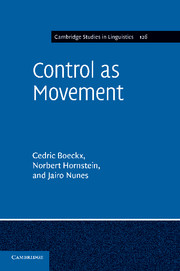Book contents
- Frontmatter
- Contents
- Acknowledgments
- 1 Introduction
- 2 Some historical background
- 3 Basic properties of the movement theory of control
- 4 Empirical advantages
- 5 Empirical challenges and solutions
- 6 On non-obligatory control
- 7 Some notes on semantic approaches to control
- 8 The movement theory of control and the minimalist program
- References
- Index
5 - Empirical challenges and solutions
Published online by Cambridge University Press: 07 September 2010
- Frontmatter
- Contents
- Acknowledgments
- 1 Introduction
- 2 Some historical background
- 3 Basic properties of the movement theory of control
- 4 Empirical advantages
- 5 Empirical challenges and solutions
- 6 On non-obligatory control
- 7 Some notes on semantic approaches to control
- 8 The movement theory of control and the minimalist program
- References
- Index
Summary
Introduction
In this chapter we discuss a fair sample of the empirical challenges that have been perceived by many as providing lethal counter-arguments to the MTC.
We will start with apparent problems that stem from contrasts between raising and control constructions. Sections 5.2 and 5.3 examine cases where raising is not allowed, but control is. Sections 5.4 discusses cases in which the different morphological patterns associated with raising and control have been interpreted as showing that control constructions involve a case-marked PRO. In sections 5.5, we examine control constructions involving promise-type verbs and control-shift phenomena, which appear to be at odds with the minimality assumptions underlying the MTC. Finally, in sections 5.6 we discuss partial and split control, which at first sight seem to require the postulation of PRO, as the controllee appears to be distinct from the controller.
As the reader will see, the apparent problems have more to do with a proper characterization of the relevant constructions than with the MTC itself. It is beyond the tenets of this chapter to offer an independent full-fledged account of each of them. However, we will show that, under very reasonable assumptions (most of which are standard in GB and/or minimalism), the apparently problematic data can receive a streamlined analysis under the MTC and in many cases turn out to actually provide compelling evidence in its favor.
- Type
- Chapter
- Information
- Control as Movement , pp. 125 - 194Publisher: Cambridge University PressPrint publication year: 2010



